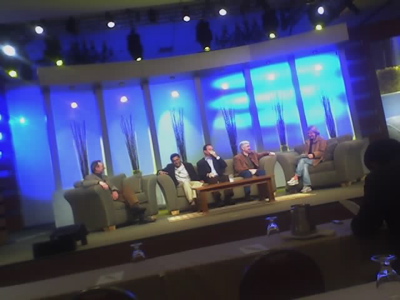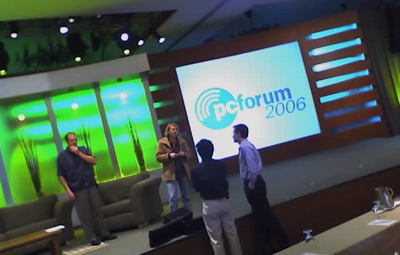Behavorial targeting 1.0 got a bad name, and for good reason. Collecting consumer information without permission was a sure-fire way to get flamed and trashed. It’s not that the hearts of these vendors weren’t in the right place — after all, we’d all prefer more targeted, relevant ads. But, lo and behold, as online advertising has taken off on such a rocket growth trajectory over recent years, a lot has been evolving behind the scenes in this space — including even by some of the original transgressors. I’ve been impressed by what Esther Dyson and her organization bring to helping us understand this  changing world of advertising. Four of their hand.pngcked participants for this morning’s “Behavioral Targeting 2.0” panel gave us a great overview and quick education on the topic. Don McLagan of Compete told us his company has been doing permission-based behavioral targeting for more than 4 years, and now has 50 terabytes of data under its care. He says his firm is “the eyes and ears of what consumers are doing and saying online.” How permission-based is his service? He says it’s actually not a dual, but a tri opt-in system. Arvind Rajan of Grassroots said his firm began life as an ASP for political organizations but now has corporate clients, due to its understanding of the individual activist. Release 1.0 said in its current issue that it “is perhaps the most effective, most one-to-one marketer” here. Dean Thompson of mSpoke offers a service for online publishers based on what it calls its “adaptive personalization engine,” which lets users manage their own content and ad preferences. These preferences are represented in something the user can see and edit, which it calls “memes.” Dave Morgan of Tacoda also is pushing the notion of showing consumers their own information, and letting them change it. They don’t have a direct relationship with the consumer, but implement their service through publishers. Morgan was quick to remind is that “advertising pays for 99% of what’s on the web.” The newspaper industry, in which he once worked, “is dying because it thought it could sell online subscriptions.” But there’s a lot of room for more growth in online advertising, since he said “40 percent of online search results pages still have no ads on them.” And yet 90 percent of online ad revenues go to just those search engines: Google, Yahoo, MSN, and AOL.
changing world of advertising. Four of their hand.pngcked participants for this morning’s “Behavioral Targeting 2.0” panel gave us a great overview and quick education on the topic. Don McLagan of Compete told us his company has been doing permission-based behavioral targeting for more than 4 years, and now has 50 terabytes of data under its care. He says his firm is “the eyes and ears of what consumers are doing and saying online.” How permission-based is his service? He says it’s actually not a dual, but a tri opt-in system. Arvind Rajan of Grassroots said his firm began life as an ASP for political organizations but now has corporate clients, due to its understanding of the individual activist. Release 1.0 said in its current issue that it “is perhaps the most effective, most one-to-one marketer” here. Dean Thompson of mSpoke offers a service for online publishers based on what it calls its “adaptive personalization engine,” which lets users manage their own content and ad preferences. These preferences are represented in something the user can see and edit, which it calls “memes.” Dave Morgan of Tacoda also is pushing the notion of showing consumers their own information, and letting them change it. They don’t have a direct relationship with the consumer, but implement their service through publishers. Morgan was quick to remind is that “advertising pays for 99% of what’s on the web.” The newspaper industry, in which he once worked, “is dying because it thought it could sell online subscriptions.” But there’s a lot of room for more growth in online advertising, since he said “40 percent of online search results pages still have no ads on them.” And yet 90 percent of online ad revenues go to just those search engines: Google, Yahoo, MSN, and AOL.
After the session, at lunch, I ran into the CEO of another “behavioral 2.0” company — Bill Day of When U (formerly head of About.com) — and I asked him for his reaction to the panel. Esther Dyson had even mentioned near the end of the panel that Bill could have been up on stage himself. He said the 2.0 version of behavorial targeting is definitely characterized as being more consumer centric. He said there are three things central to this new generation of the technology: the privacy model (from a technical standpoint), disclosure, and user value — meaning what consumers get in return. In the 1.0 version, he said the latter “was basically nothing.” Regarding his firm’s privacy model, he said they save no data — it’s all on the consumer’s local machine — and they disclose everything. The user value WhenU provides is all about relevancy. His customers include car companies, ABC-TV, LowerMyBills.com, Travelocity, Orbitz, and the firm has a partnership with Overture (Yahoo). “Eighty-five percent of the web is ripe for a new kind of advertising,” he said. “There are large opportunities.” His firm’s model is direct to the consumer, and there aren’t many in this space, he noted. “And ours is the most realtime solution, too” which is critical, he says, because the life of behavioral data is very short — maybe 24 hours. “So advertisers need us to provide the ability to suggest ‘at the moment’.”
 institutions that now have it. But a big takeaway is that all this won’t happen soon. Scott Mitic of
institutions that now have it. But a big takeaway is that all this won’t happen soon. Scott Mitic of 
Recent Comments